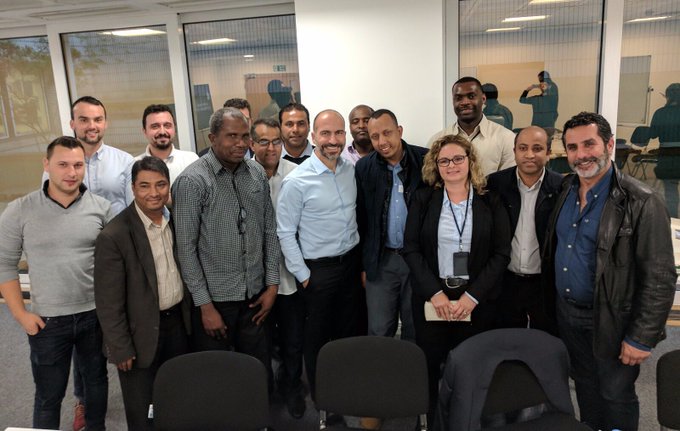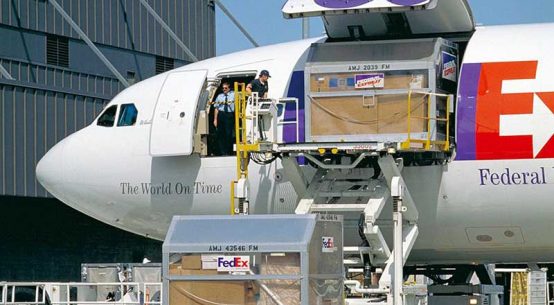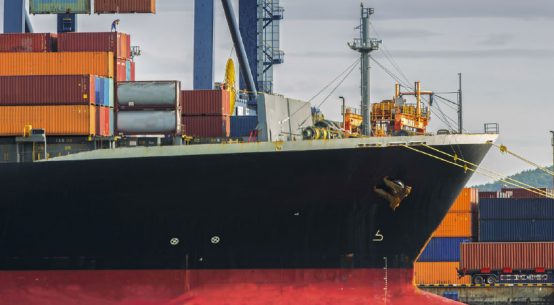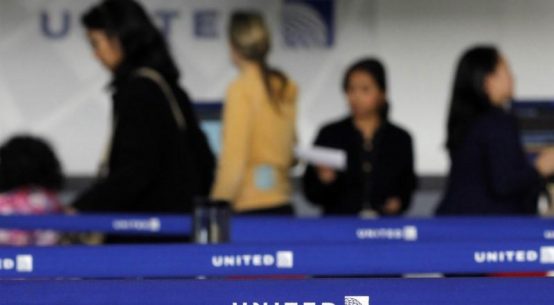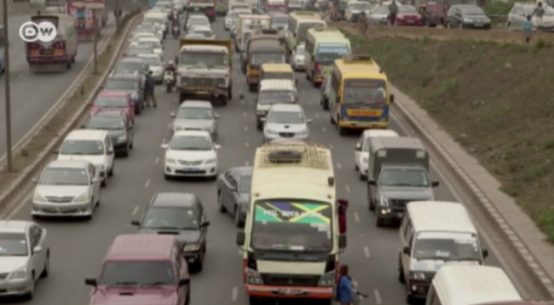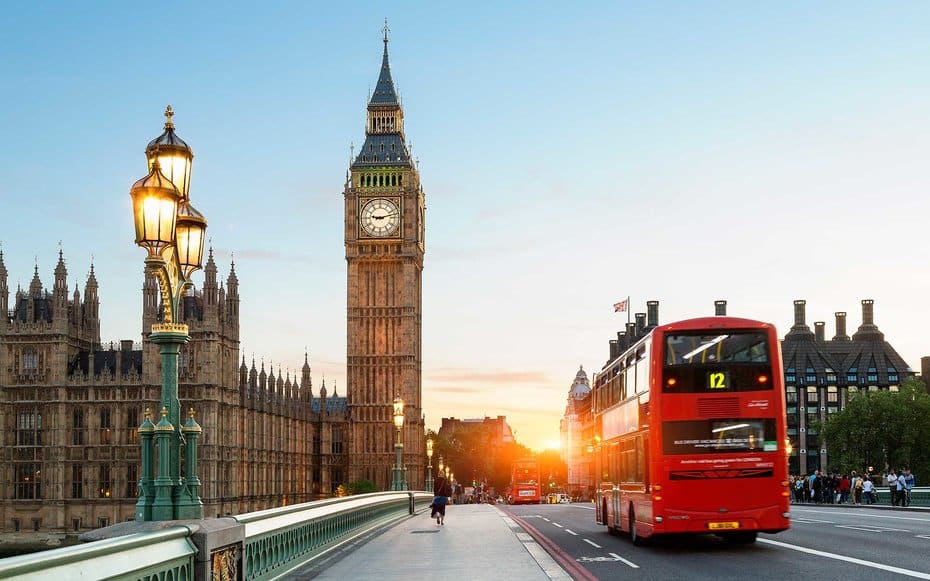
LONDON (NYT) — Less than two weeks after being stripped of its license in London, Uber has gone on a charm offensive to win it back.
Even as the ride-hailing company’s board grappled with internal divisions and a major investment hung in the balance, the company’s new chief executive, Dara Khosrowshahi, flew to the British capital, its biggest European market, to hold talks with the city’s transport chief on Tuesday.
After the meeting, Mr. Khosrowshahi tweeted a picture of himself with more than a dozen smiling Uber drivers, writing, “Determined to make things right in this great city!”
There had been much hype ahead of the talks, but neither side gave much away. Uber and Transport for London, which oversees much of the city’s public transport system, issued separate brief statements after the meeting between Mr. Khosrowshahi and Mike Brown, London’s transport commissioner. Both described the talks as “constructive” and said they would have further discussions in “the coming weeks.”
Mr. Khosrowshahi visited London as the company he was chosen to lead just weeks ago continued to grapple with a new set of issues. Uber’s board is considering proposals to limit the power of its co-founder and former chief executive, Travis Kalanick, as it courts a major new investment.
The push to win back London is also part of a wider effort to move past Mr. Kalanick’s often-combative style and change Uber’s reputation from ruthless disrupter to the responsible corporate citizen.
No one expects a quick resolution to the dispute between Uber and Transport for London.
The regulator revoked Uber’s taxi license last month, citing an array of issues in deciding that the company was not “fit and proper” to operate in the city. Uber’s appeal of the ban could take months to resolve, and even if the company lost a second appeal, it could take the case to the highest court in the country. It can continue to operate in London throughout that process.
In the meantime, the ruling has highlighted divisions within the city.
Critics are led chiefly by London’s black-cab drivers. They must earn their licenses by memorizing 100,000 landmarks across 25,000 streets in London, an extremely difficult test known as The Knowledge. They argue that Uber drivers are underregulated and that the service systematically underprices competitors to win customers.
How Uber’s Brash Approach Backfired
A series of scandals have toppled executives, including Travis Kalanick, Uber’s co-founder.

“Their entire business model is based on predatory pricing,” said Steve McNamara of the powerful Licensed Taxi Drivers’ Association, which represents the British capital’s centuries-old black-cab sector. “Uber wants to undercut competitors, establish a monopoly and then raise prices when they have a monopoly.”
Supporters of Uber, however, are plentiful. The company has garnered nearly 850,000 signatures for a Change.org petition called “Save Your Uber in London.” Proponents argue that satellite navigation has rendered The Knowledge obsolete, that black cabs are too expensive and that Uber’s detailed tracking of drivers enhances passenger safety.
That most black-cab drivers are white, native-born Britons and many Uber drivers are immigrants serves only to complicate matters.
Meetings between Uber and Transport for London have long been controversial affairs. Under Mr. Kalanick, Uber responded to regulators’ concerns by mobilizing consumers to drown them out and by lobbying politicians at the highest level.
When the previous mayor of London, Boris Johnson, a Conservative, tried to clamp down on Uber two years ago, he was told to stand down by the prime minister at the time, David Cameron, and his chancellor of the Exchequer, George Osborne, also Conservatives.
One of Mr. Cameron’s senior advisers at the time, Steve Hilton, is married to Rachel Whetstone, who was the head of communications for Uber. The couple are godparents to one of Mr. Cameron’s children. The meetings often took place at 10 Downing Street and were chaired by Daniel Korski, Mr. Cameron’s technology adviser.
If there have been changes at the highest level at Uber, the dynamics in London have changed, too. The new mayor, Sadiq Khan, is a member of the opposition Labour Party and not beholden to the Conservative government of Prime Minister Theresa May, Mr. Cameron’s successor.
For Uber, the London ban is but one of the several headaches around the world that the company’s leadership must confront.
While Mr. Khosrowshahi is on his diplomacy mission, Uber’s board is scheduled to discuss proposals that would limit Mr. Kalanick’s power. That meeting will include two new directors named by Mr. Kalanick late last week, a surprise move that escalated tensions with other board members.

The proposals are tentatively linked to a pending $10 billion investment in the company from a group led by SoftBank of Japan, a potential deal that Uber’s board has worked on for weeks.
It is a sign of the importance of the London ban that, even with Uber’s board meeting set to take place, Mr. Khosrowshahi flew here to meet with the authorities. With 40,000 drivers and 3.5 million customers, the city is Uber’s biggest market in Europe, and one of its largest in the world.
“London is the Champions League of transportation,” Mr. Kalanick told the British newspaper City A.M. three years ago, referring to a top European soccer tournament. “It has got a more dynamic, more competitive transportation system than any other city in the world.”
The effort on Tuesday is meant to show that Uber is adopting a more conciliatory approach to working with cities. Such a change in attitude is important as Uber continues to expand globally and justify its sky-high $68.5 billion valuations ahead of an initial public offering that Mr. Khosrowshahi has said could come in 2019.
There are plenty of challenges, though.
The company’s most senior executive based here, Jo Bertram, recently resigned. And elsewhere, Uber continues to face pressure from both governments and competitors. It gave up its ambitions to expand in China last year when it sold its operations there to a venture run by Didi Chuxing, a homegrown rival. It also sold its Russian business this summer to a new joint venture run by its main competitor in that country, Yandex.
Uber has also faced criticism over the treatment of its drivers. Last month, the company appealed a British court decision in which judges ruled that Uber drivers should be classified and treated as employees. The company argues that its drivers are self-employed contractors.
That claim has come in for scrutiny from Europe’s highest court as well. Any shift in how Uber treats its employees would have wide-reaching implications not just for the company but also for the so-called gig economy, forcing “on demand” businesses to offer workers the payments, protections and benefits that full-time employees are typically entitled to.
Notably, however, Transport for London’s ruling revoking Uber’s license here made no mention of the company’s labor practices.
“It’s absolutely extraordinary that workers’ rights have not come into it,” said Caroline Russell, a Green Party member of the London Assembly, a mini-legislature that scrutinizes City Hall.


